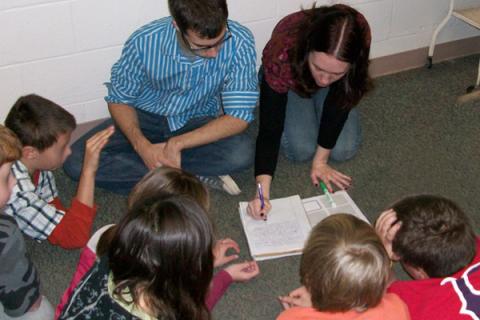
Community engagement is central to our mission. The Education Department has collaborative relationships with multiple schools and community agencies. During the past five academic years, more than 144 school and youth programs, in more than 58 cities and towns, benefitted from 2,983 UNH Education students through over 730,218 hours of community outreach!
Globally engagement under faculty direction is growing. Students have spent a total of 114 days engaged in Bhutan and Nepal for 1140 hours in meaningful learning in global communities.
The STEM Teachers' Collaborative is an interdisciplinary effort across the University to coordinate and enhance our capacity to strengthen the STEM pipeline, with the primary goal of increasing K-12 teachers’ expertise in computing, engineering and technology and extending the impact of excellent STEM teachers to more students throughout the state.
For more information about the STEM Teachers Collaborative, contact stem.teachers.collaborative@unh.edu.
The Community Literacy Center connects practicing teachers, pre-service teachers, youth, families and Education Department faculty around the common goal of excellent literacy learning throughout the state of New Hampshire.
Project SEARCH is designed to provide an on-campus, intellectually challenging experience for academically motivated high school students. The program has been in operation since 1983, and the total program enrollment ranges from 200-225 students.
Seacoast Reads places UNH undergraduate volunteers into local schools, libraries, and after-school programs to help elementary and middle school students improve their reading and writing skills through one-on-one support.
The Center on Inclusive Education (CIE) at the University of New Hampshire is a leader in the transformation of schools so that students of all abilities are successfully learning in their home schools within general education settings.
Nondegree students who are full-time teachers or principals in K-12 New Hampshire schools may be eligible for this program.
Between 2016 and 2021, Teacher Residency for Rural Education (TRRE) offered a graduate M.Ed. program including a 15-month residency program, a community-based internship, and new teacher mentor support. TRRE recruited and prepared people with a desire to become elementary, secondary math or science teachers for students in rural, high-need schools in NH. Thirty-five (35) TRRE graduates now live, learn, volunteer and teach in TRRE partner community schools.
TRRE concluded program activities as of September 30, 2022